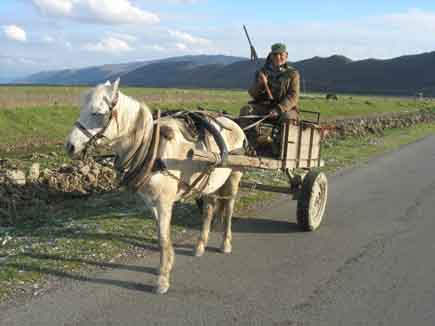
Bird hunters make the Eastern Adriatic coast a death trap for over two million birds every year.
© EuroNaturEuroNatur reveals alarming figures
Press release from 17 March 2009
Radolfzell, Germany. Like every year, the migratory birds are returning from their wintering grounds in southern Europe and Africa. Yet, "how many of them eventually arrive at their destination is a gamble", says Professor Dr. Hartmut Vogtmann, president of the foundation EuroNatur, the European Nature Heritage Fund. "Especially the Adriatic Flyway is a dangerous area for migratory birds", EuroNatur reveals in an extensive analysis about the present situation of bird hunting on the Balkans. The publication of the report is part of the campaign "Crime scene Adriatic - Bird Hunting on the Balkans", which focuses on informing the public about this big issue. "Only by international pressure we will be able to improve the situation for migratory birds in the countries along the Adriatic Flyway", claims Mr. Vogtmann.
The results of this report account for the urgent need of action. "Bird hunters ambush the birds, making the Eastern Adriatic coast a death trap for over two million birds every year", says EuroNatur project manager and ornithologist Dr. Martin Schneider-Jacoby, who was significantly involved in editing the paper. Every year, each hunter brings down at least ten birds, and this is only the tip of the iceberg, added by an unknown number of birds killed by mostly Italian hunting tourists and a large number of illegal bird hunters.
Not only rare waders and waterfowl such as the common snipe, cranes and spoonbills count among the species shot, but also species typical for our cultural landscape such as the field lark, the hoopoe and the quail.
"Those who think this happens far away, are wrong", warns Martin Schneider-Jacoby, "because when the birds fall out of the sky to their deaths the Adriatic, it will become very silent on our fields.”
Serbia, Croatia, Albania, Montenegro and Bosnia-Herzegovina offer a gloomy picture: Though these states strive for a membership in the EU, their hunting laws are miles away from European standards: extremely long hunting periods of seven months and more are usual, and neither breeding periods nor the return to breeding sites are a taboo. Only Slovenia offers a slight hint of hope; since its accession to the EU, it has made a considerable progress, being the only state along the Adriatic Flyway that consistently implements the EU-regulations of bird preservation, banning bird hunting as of January 15. This ban must urgently be imposed on the other states as well, demands EuroNatur. "As long as the flyways are not safe, even the most extensive protection measures in the breeding areas are doomed to fail in the long run", says Schneider-Jacoby.
Background Information:
- EuroNatur-Report about Bird Hunting on the Balkans: “Bird Hunting along the Adriatic Flyway - An Assessment of Bird Hunting in Albania, Bosnia-Herzegovina, Croatia, Montenegro, Slovenia and Serbia”,PDF (219 kb)
Already 20 years ago, EuroNatur, in cooperation with local nature conservationists and with the help of international bird watchers, started collecting data about bird hunting in ample field studies on the Balkans, added by a comprehensive survey of nature conservationist partners about the details of bird hunting in the respective states along the Adriatic Flyway (Albania, Croatia, Serbia, Montenegro, Bosnia-Herzegovina and Slovenia) between 2006 and 2008. The evaluation of these data is the basis for an analysis and assessment of the present bird-hunting situation on the Balkans.
- More about the EuroNatur-Campaign "Crime Scene Adriatic Coast - Bird hunting on the Balkans"
- International Conference: The preservation of migratory birds along the Adriatic Flyway is the central topic of a conference held by EuroNatur and various partners from April 14-17 2009 in Ulcinj, Montenegro. More...
Dr. Martin Schneider-Jacoby, bird expert and EuroNatur project manager will be pleased to assist you with further information, photo material and interviews.
EuroNatur
Konstanzer Straße 22
78315 Radolfzell
Phone: + 49 (0)7732 - 92 72 10
Fax: +49 (0)7732 - 92 72 22
E-Mail: info@euronatur.org
www.euronatur.org
Contact: Dr. Martin Schneider-Jacoby
Press contact: Katharina Grund


